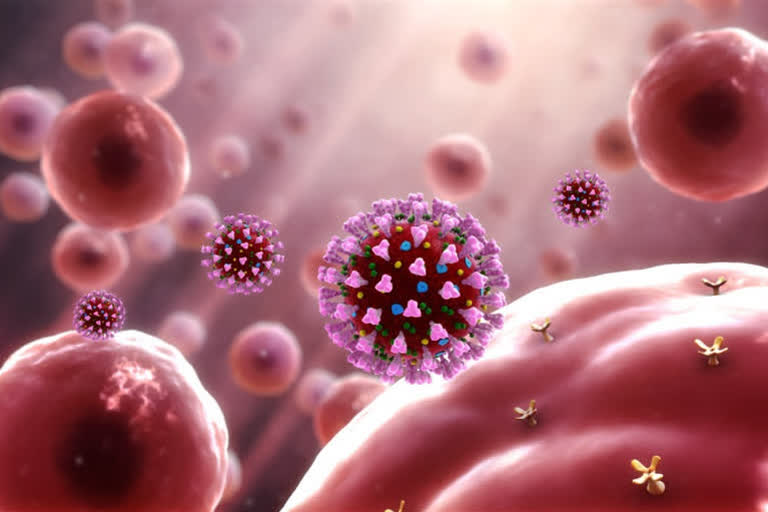New Delhi: Amid a little stability over COVID-19 infection across India, the Central government on Tuesday cautioned that the coming winter and festive season 'could turn to be a super spreader event' for the infectious disease.
"Winter is coming. And it's a time for festivities also. This is a major reason to worry. These could be super spreader event of COVID-19," said Niti Aayog member Dr VK Paul in New Delhi.
Admitting the fact that the country has been witnessing stability in COVID-19 infection, Paul said that the disease may again witness a spike (its second wave) if we do not adhere to proper health protocol.
"It's a respiratory virus. During winter it increases and we have already started witnessing in several other countries," said Dr Paul adding that until a vaccine is introduced, people must opt a COVID appropriate behaviour.
Keeping the coming months of winter and festivities in mind, the Central government has also launched a Jan Andolan movement to fight COVID-19. Launched by Prime Minister Narendra Modi on October 8, the movement aims to reach out more than 90 crore people in October-November and spread the message of maintaining COVID health protocol.
"Under the mission, we will try to reach out even to the grassroots level so that the message of awareness comes from the bottom level," said Amit Khare, Secretary in the Information and Broadcasting Ministry.
Under this mission, there will be an extensive mass campaign, involving frontline workers like teachers, Anganwadi workers, Panchayat Sevaks etc.
Read:| COVID-19 Pandemic and Multidisciplinary Human Capital
"We will target to reach out to the beneficiaries of government schemes like MGNREGA, PM Awas, PM-Kisan etc," said Khare.
He said that COVID-19 initial message to the people was to keep the virus at bay "now the new normal is live with the virus."
He said that Union Home Minister Amit Shah in a meeting on September 28 chalked out the strategy which was later informed to the State Chief Secretaries by the Cabinet Secretary.
He informed that the first week of the Jan Andolan mission (unite to fight Corona) garnered 2.33 billion impressions among 25.1k users with 61.3k mentions.
He also said that the need of the time is to spread the right message to the people and stop spreading the wrong message or propaganda which is not in COVID protocol. "Something which is not right should be restricted," said Khare.
He was referring to a reported statement made by Vallabhbhai Kathiria, chairman of Rashtriya Kamdhenu Aayog where he said that cow dung can protect everyone...it's scientifically proven...this is a radiation chip that can be used in mobile phones to reduce radiation.
Accordingly, all the Ministries through their subsidiary and related departments are trying to reach to the people.
Officials from all the concerned ministers have been briefing reporters on the status of COVID-19 disease in India.
Referring to the COVID-19 reinfection, Dr Balram Bhargava, Director-General of Indian Council of Medical Research (ICMR) said that a study on this is still in progress.
"Some people in the country have reported COVID-19 reinfection...even the WHO has not decided the definition of reinfection, whether it is 100 days or more when the virus catches back," he said.
Bhargava said that change of virus mutation takes a decade or two before it can pose as a danger.
Meanwhile, Union Health Secretary Rajesh Bhusan said that results of Phase III of Oxford's CCOVID-19 vaccine being conducted by the Serum Institute of India (SII) are expected to come by November end or December.
He said that the two indigenous COCIV-19 vaccines are also doing good.
Bhushan has expressed concern that spike in COVID cases in Kerala is a matter of concern.
"Kerala is now reporting third-highest daily cases. It was not even in the top 10 a few weeks ago. We are in constant touch with the state government to deal with the situation," said Bhushan.
The Health Ministry also expressed concern over COVID-19 deaths in relatively younger ages.
"10 per cent of the total COVID- 19 fatalities in India have been reported in people in the age group of 26-44 years and 35 per cent of deaths in the age group of 45-60 years," said Bhushan.
Of the total deaths, 70 per cent are male and 30 per cent are female. 53 per cent of deaths took place with the people above the age group of 60. And people with co-morbidities are critically affected.
He said that India has registered 63 lakh recoveries till date which is highest in the world. "Active cases is below 9 lakh in India for the last five consecutive days at present," he said. India has registered 1,09,856 deaths till date.
He said that average daily positivity rate has also decreased from 9.21 per cent between September 16-22 to 6.24 per cent in October 7-13.
Bhushan said that amid an increasing number of testing, the positivity rate is also declining.
14 states and UTs in India including Mizoram, Gujarat, Jharkhand among others have witnessed lower positivity rate than the national average of 8.07 per cent.
As many as 10 states account for 79 per cent of the total cases in India with Maharastra 25.38 per cent, Karnataka 13.81 per cent, Kerala 11.26 per cent, Andhra Pradesh 5.24 per cent.
Read:| Plans for Durga Puja inside Kolkata Medical College invite criticism



